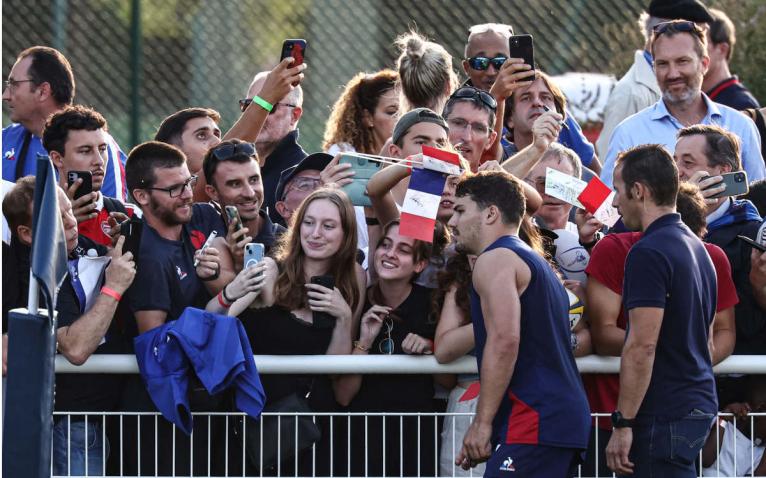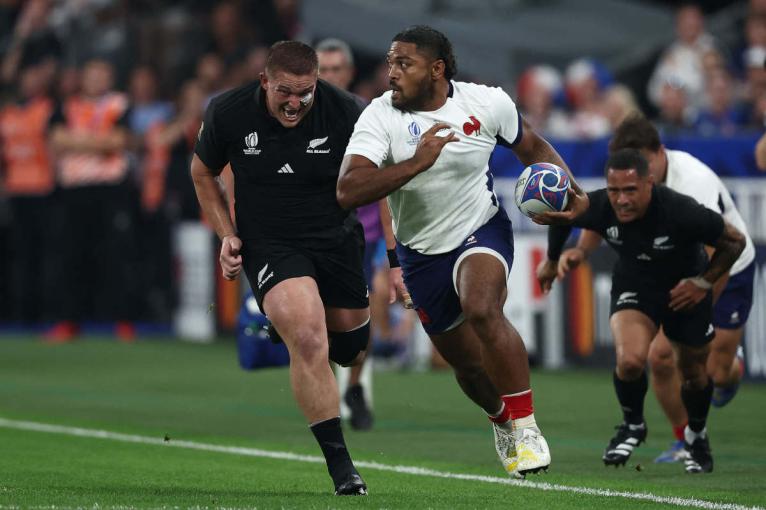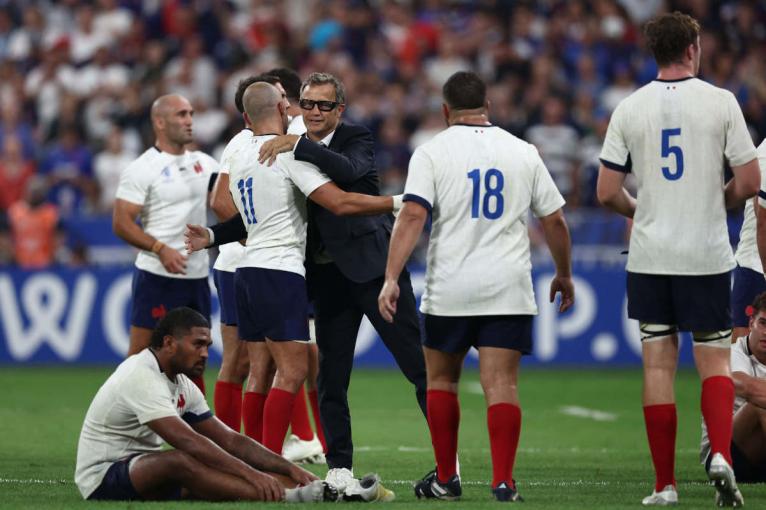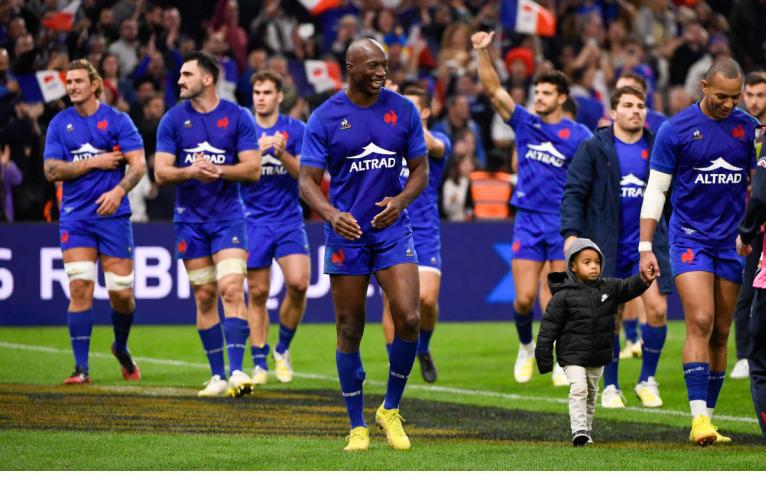There was a noticeable absentee among the 79,000 lucky enough to be at the Stade de France on Friday evening. And this was the man responsible more than most for the staging of the World Cup in France.
Where was Bernard Laporte? In its Monday edition, Midi Olympique put the question to his successor as FFR president, Florian Grill. Having acknowledged Laporte’s role in bringing the World Cup to France, Grill said that he will be delighted to welcome him to future France internationals once he has paid off an outstanding debt to the federation.
Nonetheless Laporte, who was in Marseille on Saturday night to see England beat Argentina, must have been delighted with the way France disposed of New Zealand. He would also have been tickled to learn that the peak television audience on Friday night was 17 million.
France has fallen back in love with its rugby.
‘Crazy Bernie’ may have his faults but it was he who played Cupid, the man who brought the two back together. Laporte pinpointed the problem in an interview in 2019. “The French XV no longer makes people dream,” he explained. “That’s obvious, and has been for almost ten years. We need to get back to winning, because it’s the showcase of our sport.”

They were already back to winning ways when Laporte was convicted last year of corruption. He’s now long gone but the Bleus are still winning, and the World Cup could be theirs in a few weeks.
How did Laporte do it? It was foremost a collective effort, a realisation from all the major actors in French rugby – the Federation, the clubs, the LNR and the grassroots – that the sport had lost its way. Spectator numbers were down, television audiences were down, registered players were down and morale was down.
In a column in Rugby World magazine in October 2015, days after France had been thrashed 62-13 by New Zealand in the quarter-final of the World Cup, I wrote: “It’s difficult to convey the depths of the despondency in France right now. Just about everyone involved in the sport recognises that a fundamental change is required in the way rugby is coached, structured and managed if France isn’t to slip irredeemably into the second tier of world rugby.”
Camou was up for re-election in December 2016 and in a vicious battle he lost to Laporte. Had he not, who knows what might have been the fate of the French XV.
But not quite everyone. The president of the FFR, Pierre Camou, didn’t believe there was much wrong with the sport. He had been in his post since 2008, a period in which he had presided over a steady decline in the fortunes of the French XV.
In the wake of that quarter-final defeat, Camou refused to go before the television cameras to apologise to the nation. “He is running away from his responsibilities and in doing so he is ruining French rugby,” a journalist from Midi Olympique told me.
Fortunately for France, Camou was up for re-election in December 2016 and in a vicious battle he lost to Laporte. Had he not, who knows what might have been the fate of the French XV.

Laporte’s first act on becoming president was to scrap the new national stadium proposed by Camou. Scheduled to open in 2021 in Essonne, south of Paris, the stadium would have cost €600m, money that Laporte wanted to invest in the grassroots, such as the hiring of 200 coaches to improve the technical skills of France’s young players. Among these players were those in France’s overseas territories, a rich but untapped resource for the Bleus. In the summer of 2018 Laporte visited New Caledonia in the South Pacific, the first FFR president to do so, and there he expressed his desire to see more players from the island, as well as neighbouring Wallis & Futuna, represent France. Three of France’s World Cup squad – Yoram Moefana, Sipili Falatea and Peato Mauvaka – were born in the South Pacific.
In 2017 Laporte got rid of Camou’s pick as head coach, Guy Noves, a move that cost the FFR €1m in compensation in an ugly court battle. Laporte had always wanted Galthie as coach, and he got his wish in 2019.
Galthié has always stayed loyal to the man who gave him the means. After France’s record 53-10 defeat of England at Twickenham in March, Galthié used the press conference to offer a ‘special thought’ to the recently-departed Laporte
By the time Galthie was appointed, new rules supported by Laporte were in force limiting the number of foreign players in Top 14 matchday squads and an agreement was struck between the clubs and the FFR to better manage Test players. None of this was the case when Philippe Saint-Andre was in charge of France from 2011 to 2015. “We’ve given Fabien Galthié the means,” he said in a recent interview. “He’s got a top-notch staff, the best possible means to prepare for the World Cup.”
Galthié has always stayed loyal to the man who gave him the means. After France’s record 53-10 defeat of England at Twickenham in March, Galthié used the press conference to offer a ‘special thought’ to the recently-departed Laporte, explaining: “We share this collective feeling of success with each other, but also with all the people who have been with us through the good times and the bad.”

But of course what Laporte or no one had any control over was the emergence of the most talented generation of Frenchmen in the professional era. The likes of Dupont, Alldritt, Marchand, Ntamack, Ramos and Penaud still needed to be developed but with astute coaches brought on board such as Sébastien Piqueronies – who guided France U20 to successive world championship titles in 2018 and 2019 – this generation has fulfilled its potential.
The Bleus’ World Cup slogan is ‘United for a dream’, and this cohesion was another strand of Laporte’s strategy. The elite game had lost touch with its roots when he was elected president in 2016; he helped them reconnect.
One of Laporte’s election promises during his campaign to become FFR president was a pledge to start staging Six Nations matches outside Paris; he was true to his word. In 2018 France hosted Italy at the Velodrome in Marseille, the first time they had played a tournament match outside the capital.
Next year, France’s three home Six Nations matches are in Marseille (Ireland), Italy (Lille) and Lyon (England). It is an innovation to be applauded, an indication of the FFR’s determination to spread rugby’s appeal as wide as possible.
The FFR has always been more broad-minded in that respect than the RFU. November internationals have frequently been hosted in cities other than Paris – Toulouse, Montpellier, Lille and Lyon, for example – and among the venues for last month’s World Cup warm matches were Nantes and Saint-Etienne, two regions outside the traditional heartland of French rugby.
Next year, France’s three home Six Nations matches are in Marseille (Ireland), Italy (Lille) and Lyon (England). It is an innovation to be applauded, an indication of the FFR’s determination to spread rugby’s appeal as wide as possible. The RFU should take note; England have played just two Tests at venues other than Twickenham this century – Uruguay at the Etihad in the 2015 World Cup and Italy at St James’ Park in a 2019 RWC warm-up. (England played Argentina at Old Trafford in 2009 but that was actually a ‘home’ Test for the Pumas, a request they made to raise much-needed funds at the time).

The 2023 Rugby World has therefore come at just the right time for France, allowing them to build on already solid foundations. Sixty-eight million euros arising from the tournament’s revenue have been earmarked for the amateur clubs, and initiatives are already underway.
Last week Laporte’s successor, Florian Grill, explained that the federation, supported by the government, has launched a project “in disadvantaged neighbourhoods to enable young people in these areas to discover or practise [rugby]”. This entailed 100 clubs holding 400 drop-in rugby sessions in the inner-cities. The FFR, declared Grill, is a “’federation with a mission”…the aim of achieving performance in sport, education and society.”
It was also Laporte who won the World Cup bidding war for France in 2017. The smart money had been on South Africa but Laporte drew on his political savoir-faire, acquired during his stint as Secretary of State for Sport in Nicolas Sarkozy’s government, to pull off an unexpected victory.
A few years ago Mbappe and his pals wouldn’t have made such a visit. Superstars don’t like to hang out with losers, whatever sport they play. But the French rugby squad of 2023 are winners and they are making the country dream.
It was a gamble. French rugby was still in bad shape in 2017 (they won only three of their eleven Tests that year) and few fans were seriously dreaming their boys would be serious contenders six years later. But now, according to a poll in last week’s Midi Olympique 60% of fans believe Dupont will lift the Webb Ellis Cup on October 28; furthermore, 84% of the 2,000 people polled said they had a ‘good image’ of rugby and 58% declared their intention to watch the World Cup on TV.
One of the most eye-catching images from Friday evening was the photograph of several French footballers celebrating with the rugby squad in the Stade de France dressing room. Among them was Kylian Mbappé who, like second row Cameron Woki, is from Bobigny, in the north of Paris. Two boys from the banlieues who are wonderful ambassadors for their sport and their suburb.
A few years ago Mbappe and his pals wouldn’t have made such a visit. Superstars don’t like to hang out with losers, whatever sport they play. But the French rugby squad of 2023 are winners and they are making the country dream.


Totally agree with the sentiment in taking England matches around the country, but had the FFR built their own national stadium would they have been able to do what they have done? There is a lot of flexibility in not owning your own stadium, which of course is in contrast to the RFU with Twickenham. What France has done is really no different to Aus, NZ and SA, who take their internationals around their countries
A lot of errors in this article : first choice for coach was W Gatland and not Galthie. It was clubs président who choose Galthie. When he was in Toulon, Laporte was the worst ennemy of the JIFFS system. For the next year venues, Laporte and FFR are for nothing in this choice. The only reason is indisponibility of stade de France .
sadly the french are only interested in their own team's matches, they seldom make an effort to watch the other games, as any true rugby fan would do. On friday night the sports bar I went to in France was packed and rightly so, the rest of the weekend only non french fans were present. If the French exit the RWC early then the french fans will lose their interest straight away.
Hi! You're wrong!
Friday, I will be in Toulouse at AB vs Namibia like I did in 2007 with AB vs Romania and Japan vs Fidji.
By the way, Japan vs Fidji in 2007 was the best rugby match I've ever attended, the atmosphere was crazy... and I'm a Stade Toulousain fan, so I've attended a lot of matches in my life...
Don't forget we're not on a rugby trip dedicated 100% to rugby but home, and maybe we have work and/or family. Kids went back to school last week too...
I can't go to pub all the time or my wife will kill me 😂
Great article! Thank you! I congratulate France for what they have achieved in the last 8 years. I can only wish England would follow the same roadmap.